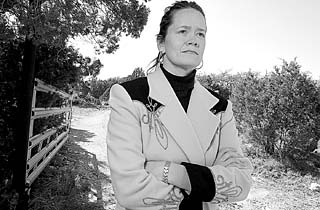Naked City
Concrete Plans
By Dan Oko, Fri., March 16, 2001

Sue Wiseman has lived at the same Cedar Park address for nearly 20 years, but during the last five, she says, her quality of life has suffered at the hands of the local Rainbow Materials concrete batch plant. The plant, where trucks are loaded with ready-mix concrete to take to nearby construction sites, has been the source of unwanted noise as well as dust that Wiseman suspects has poisoned neighborhood wells and has rendered her new $7,000 rainwater collection system unusable except for plants. With the Texas Legislature currently considering SB 546, which would streamline the process for permitting new plants and eliminate the opportunity for public comment before the plants are approved, Wiseman says the time has come to just say no.
"The Legislature is currently business-friendly to the point that it's detrimental to our community," says Wiseman, noting that the state rarely denies applications to build batch-concrete plants. "I can guarantee that if the legislators had to live next door to one of these facilities, we wouldn't have laws like this."
Wiseman isn't alone in her struggle to make sure batch plants don't ruin another community. In Harris County outside of Houston, a neighborhood group recently got a hearing before the Texas Natural Resources Conservation Commission to review air-quality concerns over a proposed batch plant. Closer to Austin, activists from the Spicewood community in Burnet County are fighting to keep Rainbow from building a plant they say would spoil the Hill Country community's rural character (see "Austin Stories," below). Last week, representatives of the Spicewood and Harris County citizens groups also came together with members of the Sierra Club and environmental attorney Stuart Henry to testify against SB 546 before the Senate Natural Resources Committee.
"If we don't fight this, we could be in real trouble," says Tracey Vickery, a Spicewood resident and mother of two. "I'm hoping that someone in the Legislature will be willing to stand up and say that we are beginning to have some real health risks here in Texas. Otherwise, rural and poor areas of this state are going to end up bearing this burden."
The bill's opponents argue that the threat posed to air quality by toxic dust from the batch plants justifies the need for public comment. By contrast, SB 546, written by Senator Buster Brown, the Republican chair of the Natural Resources Committee, would eliminate the current public comment period and require the TNRCC to approve new plants within 45 days, making minor changes in the rules that currently guide the permitting process while ensuring that certain standards, such as minimum distance from nearby residences, are met. But those seeking to defeat the bill maintain that all the legislation does is make it easier for companies to get their permits approved by the state. In response to testimony at last week's hearing, the bill was left pending at Brown's request.
Activists say the materials used in ready-mix concrete pose a high risk to human health. Concrete dust contains crystalline silica and other known carcinogens as well as toxic heavy metals, including lead, which can cause respiratory problems and lead to severe consequences for people who suffer from asthma and other breathing disorders. And many of the chemicals in the dust can also taint water supplies. Neal Carman, clean air director of the Sierra Club, had this to say about the plant permitting process: "The TNRCC's current enforcement of permit requirements, applicable regulations, and nuisance rules are commonly recognized by thousands of citizens living in dozens of communities throughout Texas as being too lax and nonresponsive to protect public health from air pollution hazards."
But Rainbow Materials owner Ramon Carrasquillo, an adjunct professor of civic engineering at UT, says those who oppose SB 546 as well as the Rainbow expansion don't understand how ready-mix concrete plants work. Carrasquillo was one of several industry reps who testified on behalf of the legislation, saying the bill would save citizens and companies both time and money. In an interview earlier this week, he reiterated his point: "All this bill does is say that if you set a limit on something, and you meet that limit, then you can get a permit. It does nothing but make sense."
But attorney Stuart Henry says the bill doesn't raise the bar from an environmental or community health standpoint. All it does, he says, is eliminate the public's ability to contest the construction of batch plants -- which paves the way, he says, for more litigation under statutes such as the federal Clean Air Act. "I think this is extremely shortsighted," says Henry. "People are going to get their say one way or another. They are either going to be able to go before the TNRCC or they are going to take their case to the courts."
Carrasquillo says the proposed plant in Spicewood will employ state-of-the-art mechanisms, such as a "hermetically sealed" loading bay, in order to protect air quality in the neighborhood. He says Hill Country residents need only to look to his relationship with those living around his other plants, such as the Cedar Park facility, to understand what sort of neighbor he is. "Maybe the problem is from a misunderstanding," he says. "With our other plants, we held public hearings and addressed all concerns. Now we are all friends. If anybody has a problem with us, I haven't heard about it."
Sue Wiseman says the reason Carrasquillo hasn't heard from his neighbors is that "the state doesn't provide us with any tools. The way they do it now, they can put one of these plants almost anywhere they want." But, she adds, "there is one good thing that has come of all this: I have finally decided that other folks don't have to live with what we live with."
Got something to say on the subject? Send a letter to the editor.








